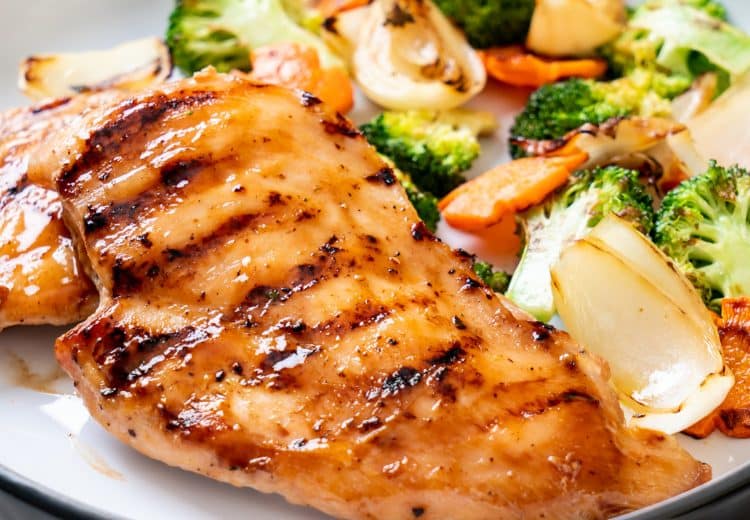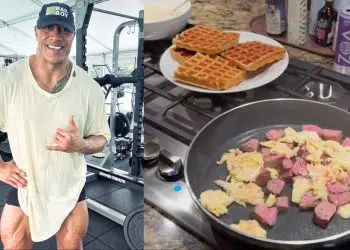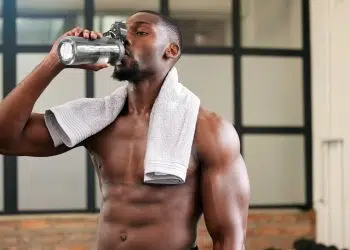Building muscle, getting stronger, and training for better sports performance all require a lot of time and energy. You need to pay your dues in the gym in sweat!
Because of this, it makes sense to try and get the most out of your workouts. An extra rep here, another set there, or more weight on the bar means faster progress toward your goals.
While your motivation, determination, and training program will all have a big impact on the quality of your workout, what you eat before hitting the gym can also influence your performance (1).
Like a racing car, your body works best when it gets the right kind of fuel.
To that end, in this article, we’re going to talk about the importance of pre-workout nutrition and what to eat before training.
The Aim of the Pre-Training Meal
Your body is loaded with energy – body fat. Fat is your primary source of fuel during aerobic activities such as low-intensity cardio. You’re also mostly burning fat during the inactive parts of your day, e.g. while working, watching TV, or sleeping.
Level Up Your Fitness: Join our 💪 strong community in Fitness Volt Newsletter. Get daily inspiration, expert-backed workouts, nutrition tips, the latest in strength sports, and the support you need to reach your goals. Subscribe for free!
Fat is so abundant that even very lean people can go for several weeks without eating. That’s good news if you are stranded on a desert island with no food. But, of course, long-term starvation is not a healthy weight loss method!
However, intense exercise uses a different type of fuel – glycogen. Glycogen is stored glucose chemically bonded to several molecules of water. We get glucose by eating carbohydrates.
Your glycogen stores are much more limited that your fat stores, and you only have enough glycogen to fuel a few hours of intense exercise. Glycogen is stored in your muscles and your liver.
When you do intense training, like lifting weights, your body uses the glycogen in your muscles for energy. So, if you do squats, the glycogen in your legs is used for fuel. Conversely, if you do bench presses, the glycogen in your pecs, triceps, and deltoids is broken down and used for energy.
Once your glycogen stores are depleted, you’ll need to rest and eat to replenish them. Trying to train before glycogen replenishment is complete could undermine the intensity and duration of future workouts. In simple terms, you’d be starting with only partially full fuel tanks.
If your glycogen levels are lower than usual, you’ll feel weak and sluggish and won’t be able to train as hard or as long as you might otherwise wish.
So, the aim of your pre-workout meal is to maximize glycogen storage so you have plenty of fuel to power you through your workout.
Ideally, you should start the refueling process shortly after finishing your last workout. That means that your pre-workout meal should “top off” your glycogen stores to make sure you start your training fully loaded with fuel.
What to Eat in your Pre-Workout Meal
Because it’s glycogen that you need to power you through your workout, the first thing to include in your pre-workout meal is carbohydrates(2). Carbs are broken down into glucose and then converted into glycogen.

Good sources of pre-workout carbs include:
- Bread
- Rice
- Pasta
- Potatoes
- Cereal
- Carb-based sports drinks
- Sports gels
The best pre-workout carbs are low in fiber. Fiber, which is indigestible plant material, contains no calories and delays the conversion of carbs into glucose by keeping food in your stomach for longer. That’s good for satiety and weight loss but not very helpful for providing your muscles with fast-acting energy.
Protein can also be helpful in pre-workout meals. Consuming protein before training can help minimize muscle catabolism (breakdown) and increase post-exercise protein synthesis (3). While some muscle breakdown is unavoidable, the less you experience, the faster you’ll recover between workouts.
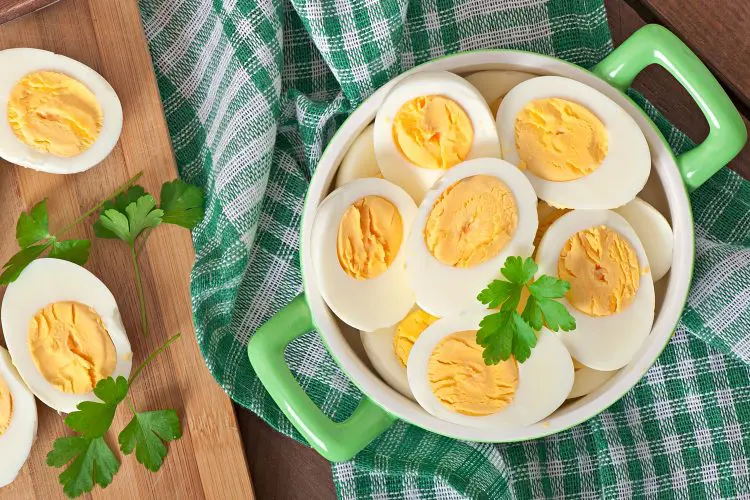
Good sources of protein include:
- Whey protein
- Chicken
- Fish
- Eggs
- Lean beef
- Beans and pulses
Related: 40 Great Protein-Packed Foods
The final food group, fat, should NOT make up a large part of your pre-workout meal. Like fiber, fat is a gastric inhibitor and delays digestion, meaning it keeps food in your stomach for longer. As such, you should seek out lean proteins and not add extra fats, even healthy varieties like olive oil, to your pre-workout meals.
Level Up Your Fitness: Join our 💪 strong community in Fitness Volt Newsletter. Get daily inspiration, expert-backed workouts, nutrition tips, the latest in strength sports, and the support you need to reach your goals. Subscribe for free!
Regarding meal size, that really depends on how many calories you eat per day, your current body composition goal (get lean, build muscle, or maintain your current weight), and your ability to digest your meals. Bigger is not always better.
20-30 grams of protein and 75-100 grams of carbs should be sufficient, providing you with between 400-600 calories. This should be more than enough energy to get you through your workout but still be digested by the time you start training.
When to Eat Your Pre-Workout Meal
Ideally, there should be enough time between your pre-training meal and your workout for the food to digest more-or-less fully. You want your stomach to be empty and the nutrients to reach your muscles before you start your first set. Training with a stomach full of partially digested food can be very uncomfortable and also defeats the point of eating a pre-workout meal.
As people tend to digest food at differing speeds, determining when to eat your pre-workout meal may take some experimentation. For example, you may feel ready to go after just an hour or so or need two to three hours for your food to digest. The size of your meal also matters, and a big meal will take longer to digest than a pre-workout snack.
If in doubt, err on the side of caution and leave 2-3 hours between eating and training. That way, you are less likely to feel sick during your workout.
The Best Pre-Workout Meals
So, for plenty of training energy, you need to eat a meal that consists of carbs, protein, and little fat roughly 2-3 hours before your workout. This will give the meal enough time to digest and for the nutrients to reach your muscles.
Good examples of pre-workout meals include:
- Lean protein sandwich, e.g., chicken breast or turkey.
- 3-egg omelet on whole grain toast.
- Lean beef with rice and roasted vegetables.
- Oatmeal made with low-fat milk and topped with nuts and seeds.
- Natural low-fat yogurt topped with chopped fruit and granola.
- A protein/energy bar.
What If You Don’t Have Time for A Pre-Workout Meal?
If you train early in the morning, you may not have time to eat a meal before your workout. In this case, you will need to fuel up by eating a high-carb meal the night before. You can also boost your glycogen levels by consuming fast-acting carbs shortly before your workout, e.g., as you drive to the gym.
Your body digests fluids faster than liquids, so a pre-workout shake or smoothie is a good option. Just blend a ripe banana with some yogurt, milk, and protein powder, and you’ll be good to go. Alternatively, you can chug down a high-carb sports drink such as Gatorade, which contains glucose and other fast-acting sugars.
If none of that is possible, you could just take a shot of pre-workout. Although you won’t be getting any carbs or protein, you will get a dose of caffeine and other energizers and stimulators which could help power you through your gym session. However, this is not an ideal solution as you’ll still be running on empty, and your workout will be very depleting.
What About Fasted Workouts?
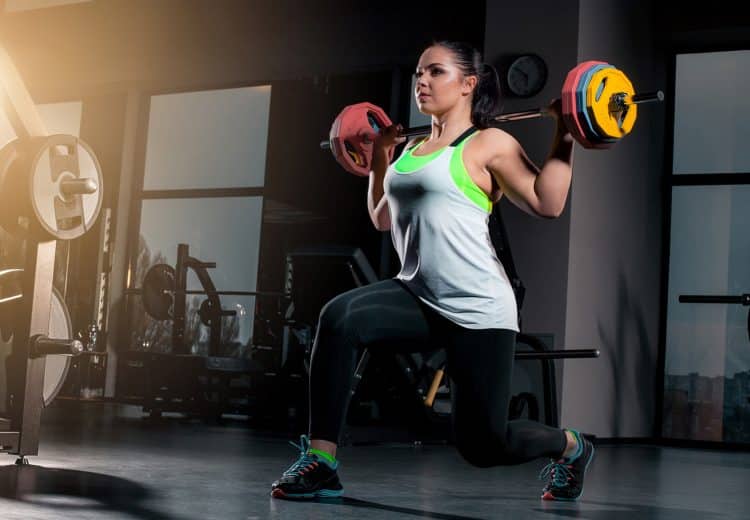
Fasted workouts are popular for fat loss and weight control. With fasted workouts, you skip your pre-workout meal entirely and don’t eat anything before training. The idea is that your body is more likely to burn fat for fuel when your glycogen stores are partially depleted.
Research on fasted exercise is inconclusive, and while some studies suggest it increases fat oxidation, others found no significant difference (4). However, anecdotally, it seems that doing cardio on an empty stomach may enhance fat burning.
However, fasted strength training is probably not a good idea. Remember, glycogen is your primary source of energy during high-intensity bodybuilding workouts. If glycogen levels are low, your strength and work capacity will deteriorate faster. This could make your workouts less effective.
So, while it’s probably okay to do fasted low and moderate-intensity cardio, fasted strength training is not a good idea for most people.
Learn more about pre-workouts
- 12 Best Pre-Workouts For Beginners in 2022
- Creatine vs. Pre-Workout
- Bodybuilding Without Supplements
- Does Pre-Workout Go Bad?
- Why Does Pre-Workout Make You Itch?
Best Pre-Workout Meal – Wrapping Up
It’s often said that you are what you eat. Your diet provides the energy for your workouts and meal timing matters. Ideally, you should try and eat carbs and protein 2-3 hours before training. This ensures that your glycogen stores are full, so you’ll have all the energy you need to power through your workout.
If that’s not possible, maybe because you train early in the morning, consume some fast-acting carbs on your way to the gym, such as a glucose-based drink.
And while you can do fasted workouts, they’re generally best left for cardio, where fat is your main energy source. Fasted strength training may mean you cannot train as hard or as long as usual, reducing workout productivity.
References:
1– PubMed: Effect of Meal Frequency and Timing on Physical Performance https://pubmed.ncbi.nlm.nih.gov/9155497/
2– PubMed: Role of Carbohydrate In Exercise https://pubmed.ncbi.nlm.nih.gov/6571232/
3– PubMed: Stimulation of Net Muscle Protein Synthesis by Whey Protein Ingestion Before and After Exercise https://pubmed.ncbi.nlm.nih.gov/16896166/
4– PubMed: Exercise Training and Fasting: Current Insights https://www.ncbi.nlm.nih.gov/pmc/articles/PMC6983467/


